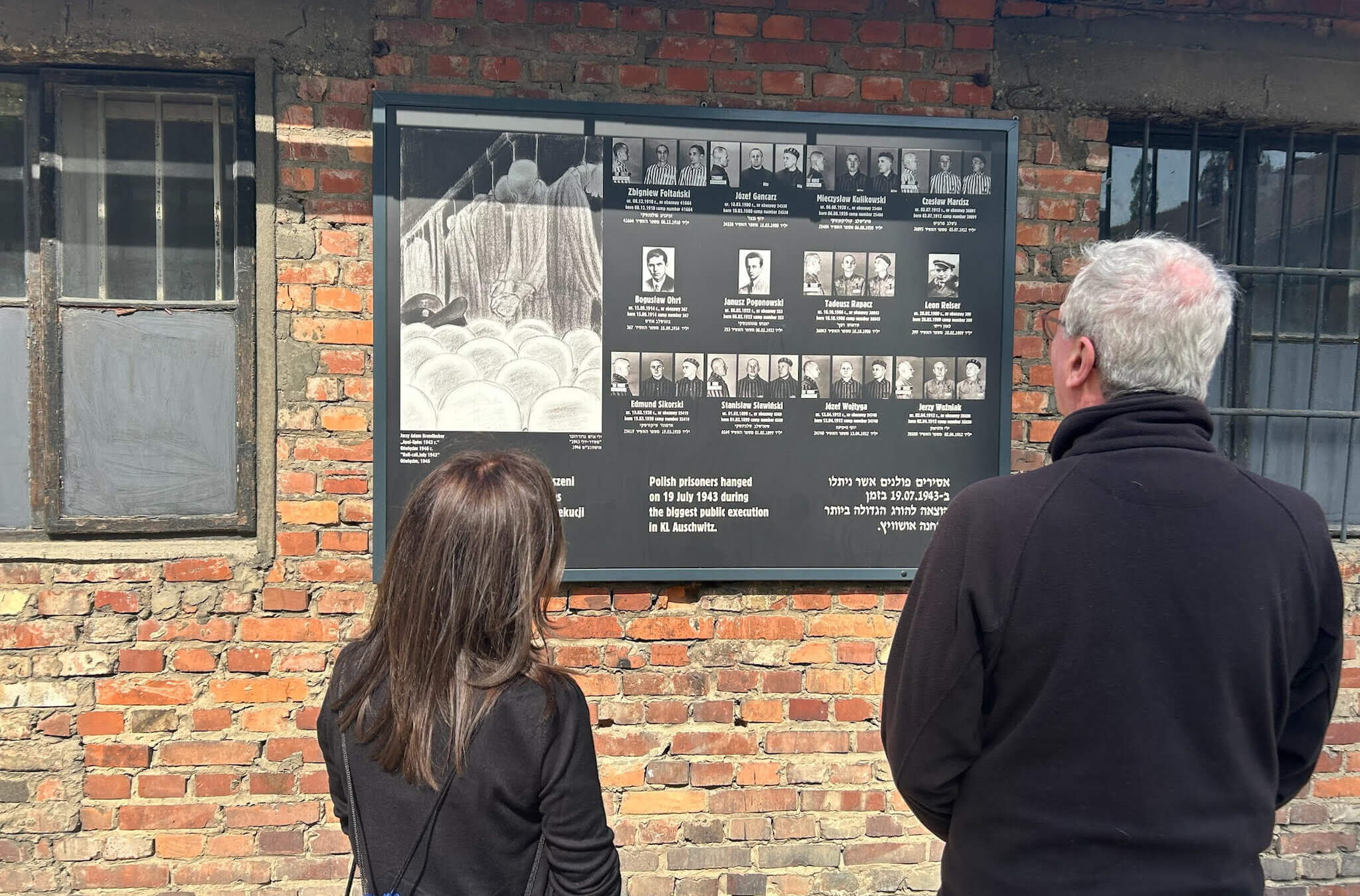On his first trip to Auschwitz, New Jersey governor urges vigilance against rising antisemitism
Murphy, nearing the end of his governorship, called the trip ‘one of the most profound moments’ of his time in office

New Jersey Gov. Phil Murphy and his wife Tammy at the Auschwitz-Birkenau museum on April 24. Photo by Gov. Phil Murphy/Twitter
The rain that fell on the thousands of participants in the March of the Living in Poland carried symbolic weight for New Jersey Gov. Phil Murphy, a Catholic with strong ties to the Jewish community.
“The heavens opened up and it unleashed rain like I’ve seldom seen outside in my life before,” Murphy said Thursday in a phone interview.
He had just attended the 80th anniversary of the liberation of the camps — and his first visit to Auschwitz and Birkenau. It was also the first time in the March of the Living’s 37-year history that it had taken place in the rain, forcing organizers to cancel the closing ceremony. In Jewish tradition, rain is seen as a symbol of divine blessing and spiritual renewal.
The March of the Living, an annual educational program founded by several Israeli officials, brings thousands of Jewish young people to Poland every year to mark Yom HaShoah, Holocaust Remembrance Day, with a symbolic march to the era’s most notorious death camps.
Murphy, a former U.S. Ambassador to Germany and now in his final year in office due to term limits, called it an “incredibly moving experience.”
Though he had visited concentration camps in Germany, Murphy said “the scale of the evil” demonstrated in Auschwitz and Birkenau is “beyond words.”
He was joined by his wife Tammy, who withdrew from the race for a U.S. Senate seat last year, and the New Jersey State Police Superintendent, Col. Pat Callahan.
The March of the Living is a three-kilometer march from Auschwitz to Birkenau – commemorating the Nazi death marches that took the lives of over 15,000 people.
— Governor Phil Murphy (@GovMurphy) April 24, 2025
As we march together in silence, we reflect on the atrocities of the Holocaust and stand in solidarity with Jewish… pic.twitter.com/PE4KfpT2YL
The delegation met with Israeli President Isaac Herzog, Polish President Andrzej Duda and a group of Holocaust survivors. Murphy also met with the British ambassador to Israel, Simon Walters, to discuss efforts to release the last living American hostage in Gaza, Edan Alexander, who is a New Jersey native.
A recent Anti-Defamation League report showed that New Jersey was the third highest state in the nation in the number of antisemitic incidents last year — 719. “Anything north of zero is unacceptable in terms of antisemitic incidents,” Murphy said. “So we’re going to have to do more of what we’ve been doing.”
New Jersey, with a handful of other states, runs a nonprofit security grant program for vulnerable communities. In 2023, the state assembly mandated Holocaust education in public schools.
In the interview, Murphy said that the trip was a “grave reminder” to prevent history from repeating itself.
“The world we live in today is too divided,” he said. “There’s too much hate, too much antisemitism, and this is a tragic, awful reminder of how that could end if we are not careful.”
Murphy won a tough reelection bid in 2021 with the strong support of Orthodox voters.
Six Democrats are competing in the June 10 primary to succeed Murphy. The contest was moved a week later than originally scheduled to accommodate Jewish voters observing the holiday of Shavuot. Businessman Jack Ciattarelli, who ran against Murphy in 2021 and received 48% of the vote, is the frontrunner in the Republican primary.
Murphy said that some of his “most cherished and most profound moments in office” were his trips and issues related to the Jewish community, including his eight trips to Israel, three as governor. He last visited the Jewish State on a four-day economic development mission in August. He said he will “run through the tape” until the end of his term in pushing back against the rise of antisemitism.















